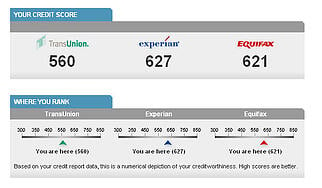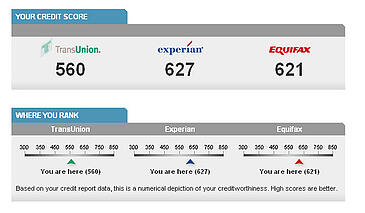 A lady from Portland, Oregon called to ask, "What really determines my credit score?"
A lady from Portland, Oregon called to ask, "What really determines my credit score?"
There is a lot of misleading information about credit scores and this information should help.
According to the Fair Isaac Corporation (FICO), your credit score is made of many factors, but the most important are:
- Payment History (35%)
- Amounts you Owe (30%)
- Length of Credit History (15%)
- Types of Credit Used (10%)
- New Credit (10%)
Your PAYMENT HISTORY (which accounts for the greatest percentage in determining your credit score) looks at how and when you pay your debts!
- Do you pay on time?
- If not, how late were you and how often were you late?
- Do you have negative items on your credit report such as a bankruptcy, judgment, lien or lawsuit?
Being late on a payment is not necessarily a terrible factor on your credit report, but they are looking at:
- How late where you (30,60, 90 days, or more?)
- How much was the balance?
- How recent were you late?
- How many times are or where you late?
The next major factor that affects your credit score is the total amounts or balances on your accounts. (This makes up 30% of your credit score!)
Having outstanding balances is not a bad thing, but what the credit reporting agencies are looking for is how much of your available credit have you used?
They refer to this as your "DEBT RATIO".
What is my debt ratio?
Let's say you have 5 Credit Card accounts with a total available credit line of $20,000.
If you have only two balances of the five and the total balance is $2,000, then your DEBT RATIOwould be only 10% (2,000/20,000).
This shows creditors that although you have $20,000 of available credit, you are only using a small percentage and therefore are a better "CREDIT RISK".
On the other hand, let's say of the $20,000 of available credit you have, you have had to charge up $15,000. Now your DEBT RATION would be 75%!
Creditors could be cautious in lending or extending any more credit to someone with that high of a DEBT RATIO!
The next factor that is used in determining your credit score is the LENGTH OF YOUR CREDIT HISTORY.
Although it may seem unfair, those who are young and/or have never established a credit history will not have a very favorable credit score, but will find it hard to be extended credit.
What type of credit accounts do you have?
The credit reporting agencies look at the various types of accounts such as:
- Credit cards
- Store or retail accounts
- Installment loans
- Finance Company Loans (pay-day loans)
- Mortgages
You don't have to have one of each, but what the credit reporting agencies are looking for are a balance.
For example, if you had 5 or 6 Finance Company or Pay-Day loans (which usually carry very high interest rates and fees), you would most likely be considered a greater risk than someone who had a couple of credit cards (Visa, Master Card, Discover, etc.) and maybe one Sears card.
Finally, what about your NEW CREDIT?
How does New Credit affect my score?
The credit reporting agencies look at several "new accounts" as a greater risk than someone who say, had been using a (or a few) credit cards for several years and just recently signed up for one store card.
It is a negative mark on your credit report to go out and sign up for several NEW ACCOUNTS in a short period of time.
One final bit of advice, DON'T CANCEL OLD ACCOUNTS!
Closing accounts does not help your credit score. You want an established credit history.
Even if you have had problems in the past, you can improve your credit score!
But what if you have so much debt that you simply cannot keep up with the payments?
Here in Oregon, we've been helping people become DEBT FREE for over 10 years.
Many people have used our DEBT SETTLEMENT program to final become DEBT FREE!
Once it has been determined that you simply cannot keep up with your minimum monthly payments and cannot meet the payment required in a Debt Consolidation or what is called a Debt Management Program, a Debt Settlement Program could be the answer!
We are not talking about secured debt (home mortgage, equity line of credit, etc.) but rather UNSECURED DEBTS, such as:
- Credit Cards
- Store Cards and Accounts
- Personal bank loans
- Deficiency Judgment after repossession
- Private Student Loan
- Pay Day Loans
- Medical bills
A Debt Settlement Program can help you:
- By lowering your monthly total debt payment
- Potentially save you thousands of dollars by negotiating a settlement for less than the full balance due
- Avoid turning to Bankruptcy!
photo by: Casey Kinstantin







